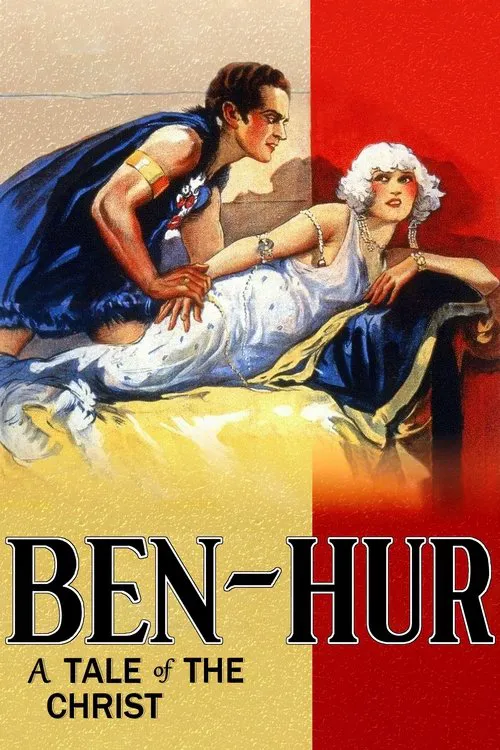Ben-Hur: A Tale of the Christ

Plot
In the midst of ancient Rome's sprawling empire, a tale of brotherhood, betrayal, and redemption unfolds as the narrative of Judah Ben-Hur weaves its way through the annals of history. The story commences with the reunion of Judah Ben-Hur, an erstwhile childhood friend of Messala, a high-ranking Roman officer, who has returned to Jerusalem as a conqueror. Judah's family, once held in high esteem, has now been reduced to a pitiful existence, with Judah's parents and sister struggling to survive in the face of Roman domination. As the Roman Empire celebrates its victory with elaborate processions, a small incident occurs – a brick is dislodged, striking Messala and causing a stir among the Roman guards. The chaos that ensues leads to a fateful decision, as Judah is arbitrarily arrested and taken away, his property confiscated, and his mother and sister imprisoned. With seemingly no hope of redemption, Judah is condemned to a life as a galley slave, a fate worse than death, with the prospect of being auctioned off to the highest bidder and forced to spend the rest of his days at the mercy of ruthless Roman crew members. Years pass, and the once-proud Judah is now nothing more than a nameless slave, a mere tool to be exploited for his strength and endurance. However, fate has a way of testing one's resolve, and it is through his unwavering determination to survive that Judah begins to see glimmers of hope. Under the watchful eye of his Roman master, Judah demonstrates a unique combination of intelligence, cunning, and physical prowess that earns him a place in the Roman legions. His innate talent for horsemanship and his natural charm soon catch the attention of the Roman commander, who notices his ability to effortlessly ride the most majestic of steeds. Judah's fortunes take a dramatic turn as he becomes an exalted and celebrated Roman athlete, admired by the Roman elite for his exceptional horsemanship and athletic prowess. His rise to prominence, however, serves only to highlight the depth of his sorrow and the burning resentment he harbors towards Messala, his former childhood friend who was once as close to him as a brother. The unrelenting desire for revenge gnaws at his soul, a heavy burden that Judah has carried with him since his imprisonment. As the narrative unfolds, Judah's obsession with revenge becomes an all-consuming force that threatens to destroy the very fabric of his being. His quest for vindication is fueled by the absence of any concrete proof that his mother and sister are alive. This uncertainty fuels the smoldering fire of his anger, causing him to fixate on nothing but the ultimate goal of destroying Messala, regardless of the cost. In the process of his relentless pursuit, Judah unwittingly embarks on a journey of self-discovery and personal growth. Through his involvement with Rome's imperial forces, Judah gains an unvarnished glimpse into the harsh realities of the Roman Empire, where conquest, destruction, and domination are the hallmarks of an ever-expanding empire. The realization that his former friend and companion has transformed from a gentle friend into a ruthless conqueror sends shock waves through Judah's being, forcing him to re-evaluate the complexities of human nature and the destructive nature of unchecked ambition. Throughout the narrative, one figure stands out – a young girl named Esther, who captures Judah's heart with her kindness, compassion, and unwavering faith in the face of adversity. Her quiet strength is a beacon of hope in the midst of darkness, serving as a potent reminder of the enduring power of love and redemption. As Judah grapples with his conflicted emotions, Esther's presence becomes an ever-present force, gently coaxing him towards the path of forgiveness and healing. The film builds towards a climactic confrontation between Judah and Messala, two men whose once-close bond has been irreparably shattered by the trials of war and the insatiable lust for power. The tension between the two is palpable as they engage in an epic battle of wits, where the line between friend and foe blurs. A poignant denouement ultimately unfolds as Judah, with Esters help, comes to a realization that his years of anger have blinded him to the simple, yet profound truth that forgiveness is the most potent form of redemption. In the end, Judah learns to let go of his unrelenting desire for revenge and chooses instead to pursue a path of peace, forgiveness, and understanding. The film closes with a poignant tableau of Judah's newfound peace, as he is reunited with his sister, who has survived the rigors of imprisonment and is finally free to love and be loved in return. This heartwarming conclusion is a testament to the human spirit's capacity for resilience, forgiveness, and the enduring power of love in the face of overwhelming adversity. As the curtain falls, the narrative of Judah Ben-Hur emerges as a timeless tale of redemption, forgiveness, and the unwavering power of the human spirit.
Reviews
Recommendations




